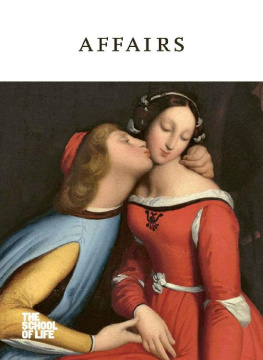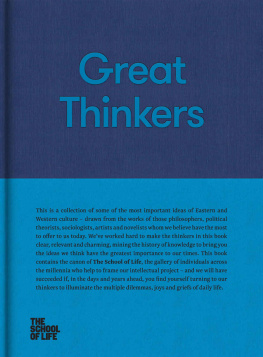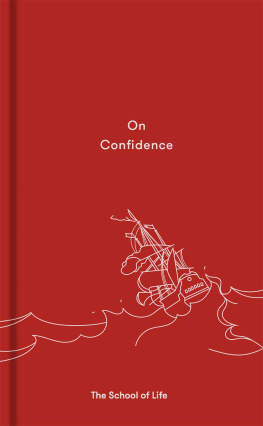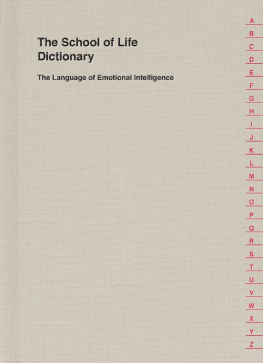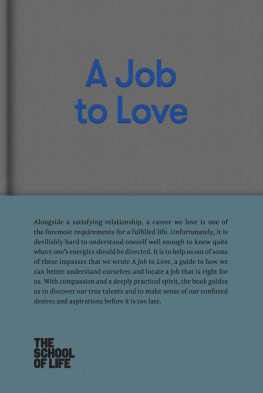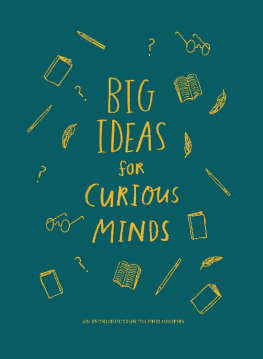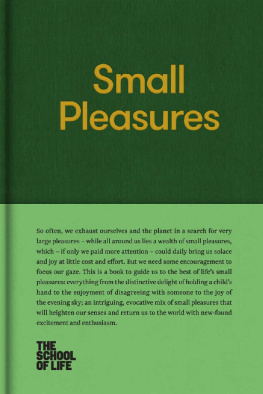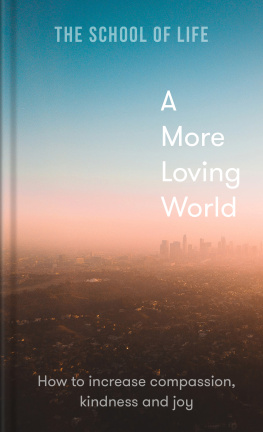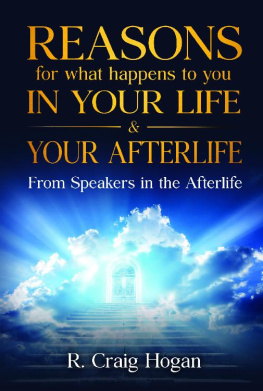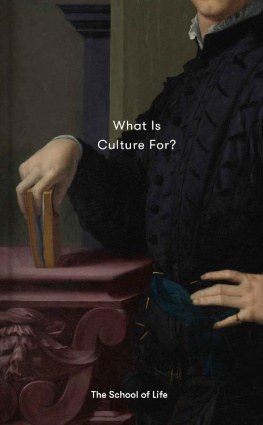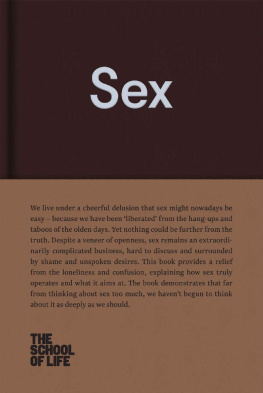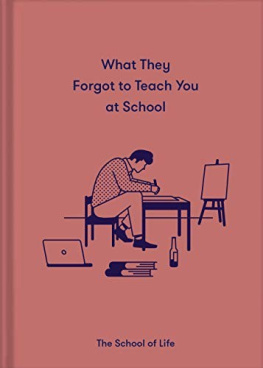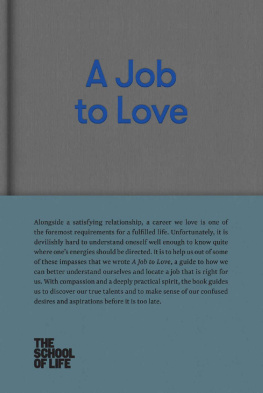The School of Life - Affairs (The School of Life Love series)
Here you can read online The School of Life - Affairs (The School of Life Love series) full text of the book (entire story) in english for free. Download pdf and epub, get meaning, cover and reviews about this ebook. year: 2019, publisher: The School of Life Press, genre: Home and family. Description of the work, (preface) as well as reviews are available. Best literature library LitArk.com created for fans of good reading and offers a wide selection of genres:
Romance novel
Science fiction
Adventure
Detective
Science
History
Home and family
Prose
Art
Politics
Computer
Non-fiction
Religion
Business
Children
Humor
Choose a favorite category and find really read worthwhile books. Enjoy immersion in the world of imagination, feel the emotions of the characters or learn something new for yourself, make an fascinating discovery.
- Book:Affairs (The School of Life Love series)
- Author:
- Publisher:The School of Life Press
- Genre:
- Year:2019
- Rating:3 / 5
- Favourites:Add to favourites
- Your mark:
- 60
- 1
- 2
- 3
- 4
- 5
Affairs (The School of Life Love series): summary, description and annotation
We offer to read an annotation, description, summary or preface (depends on what the author of the book "Affairs (The School of Life Love series)" wrote himself). If you haven't found the necessary information about the book — write in the comments, we will try to find it.
Affairs (The School of Life Love series) — read online for free the complete book (whole text) full work
Below is the text of the book, divided by pages. System saving the place of the last page read, allows you to conveniently read the book "Affairs (The School of Life Love series)" online for free, without having to search again every time where you left off. Put a bookmark, and you can go to the page where you finished reading at any time.
Font size:
Interval:
Bookmark:
AFFAIRS
Published in 2019 by The School of Life
70 Marchmont Street, London WC1N 1AB
Copyright The School of Life 2019
Printed in Belgium by Graphius
All rights reserved. This book is sold subject to the condition that it shall not be resold, lent, hired out or otherwise circulated without express prior consent of the publisher.
A proportion of this book has appeared online at
www.theschooloflife.com/thebookoflife/
Every effort has been made to contact the copyright holders of the material reproduced in this book. If any have been inadvertently overlooked, the publisher will be pleased to make restitution at the earliest opportunity.
The School of Life is a resource for helping us understand ourselves, for improving our relationships, our careers and our social lives as well as for helping us find calm and get more out of our leisure hours.
We do this through creating films, workshops, books and gifts. www.theschooloflife.com
ISBN 978-1-912891-34-4
A n affair is a romantic or sexual story between two people, one of whom (at least) is ostensibly committed to someone else. Most importantly, in our times, an affair is a catastrophe, pretty much the greatest betrayal that can befall us, a harbinger of untrammelled suffering, frequently the end of the marriage it has violated and almost always an occasion for fierce moralising and the division of participants into goodies (those who have been betrayed) and monsters (those who have betrayed).
However, in trying to understand affairs and make sense of their pains, as well as their less frequently confessed attractions, we should grasp that the way in which we interpret affairs today is very particular to our own times; we are remarkably contorted about the whole business, as judged against the long span of human experience. People have always had affairs, but what an affair means has been subject to huge changes across societies and eras. In order to gain a deeper picture of what we are doing when we look beyond our primary relationships, we need to glance backwards into the history as well as briefly forwards into the future of affairs:
Quito, modern-day Ecuador, 1532
The Inca sun-king Atahualpa owns private harems scattered across his empire; he is said to have had affairs with 3,000 women. Few subjects appear to think any less of him for this. All nobles have hundreds of concubines. There are official regulations concerning the number of mistresses that anyone in government is allowed: a provincial governor can have up to twenty, the administrator of a small village, eight. Having affairs is no sinful slip; it is a central indicator of dignity and status.
Versailles, France, June 1745
The 35-year-old French king Louis XV has been married for twenty years, since the age of fifteen, to Marie Leszczyska, daughter of Stanisaw I, the deposed king of Poland, a woman whom no one expected him to love and whom he duly doesnt. Now, Louis has developed a passion for the beautiful and gracious 25-year-old Madame de Pompadour, who is herself married. She quickly becomes the most prominent in a long list of Louiss lovers. The court is delighted for Louis and no one feels especially sorry for the queen, who devotes herself to music and reading and in time takes a few lovers of her own. A royal marriage is understood in terms of political and dynastic considerations, just as at other levels of society it is seen in terms of property or business interests: a way of uniting two pieces of land or of bringing a useful son-in-law into the family workshop. To marry for love is judged an entirely irresponsible eccentricity as well as a wasted strategic opportunity. The idea that a person should spontaneously want to have sex with their spouse once children have been conceived is deemed bizarre and in essence perverted.
Leipzig, Germany, April 1774
Johann Wolfgang von Goethe publishes The Sorrows of Young Werther, which becomes the most popular novel in Europe for the next thirty years. It is the preeminent expression of certain new Romantic ideas around marriage: that we should only marry for love and that to sleep with someone outside of marriage is a grave offence, emotionally rather than religiously or socially. Nevertheless, the novel acknowledges that it can be deeply tempting to have an affair and that desire doesnt neatly follow legal rules. The hero of the novel has a flirtation with a married woman, but, because he cannot go further with her and yet is overwhelmed by his own longing, ends up seeing no other option but to kill himself. The novel emphasises that an affair or even the prospect of one can be both a source of extraordinary delight and the harbinger of calamity. The stakes feel a lot higher now that marriage is meant to be so much more than a practical alliance.
Paris, France, 7th February 1857
The French writer Gustave Flaubert is narrowly acquitted on obscenity charges brought against his novel Madame Bovary, the first detailed fictional description of sexual infidelity. The heroine of the novel, Emma Bovary, is driven to have an affair for a reason which her society now thoroughly condemns (though it would have been wholly unsurprising to Louis XV): She no longer sexually desires her husband, Charles. We are firmly in the era of Romantic marriage, and affairs have become appalling phenomena because of the expectation that marriages should be lifetime unions based on enduring love and continuous sexual enthusiasm. By insisting that a marriage partner should be everything to their spouse (coparent, domestic manager, erotic companion and soulmate), Romanticism turns an affair from a problem into a tragedy. Infidelity becomes the core theme of all the great novels of the second half of the 19th century. From Anna Karenina to Middlemarch, heroes and heroines have to die or grievously compromise their social positions following any forays outside of their vows.
Miami, United States, Sunday 3rd May 1987
The Miami Herald runs a story revealing that the married Democratic presidential candidate Gary Hart has been having an affair with Donna Rice, a sales representative for a pharmaceuticals company. Up to this point, Hart has been the frontrunner in the presidential race, but his campaign is upended by the revelation of his affair and after a week of meek protestations and contrite apologies, he withdraws. The leadership of the worlds most powerful country has largely been decided on the issue of infidelity. An affair is not simply a private matter it has become one of the sternest tests of a persons moral worth.
World Wide Web, May 1992
The Usenet newsgroup alt.polyamory is created and polyamory is formally defined for the first time as the practice, state or ability of having more than one sexual loving relationship at the same time, with the full knowledge and consent of all partners involved. Polyamory suggests a remarkable break with the uncomfortable tensions of the Romantic theory of marriage. Rather than having to love only one person and then lie about any subsequent desires, one can as a polyamorist be transparent and enjoy multiple sources of affection. The whole idea of an affair promises to disappear in a new wave of psychological openness. However, a central objection to polyamory is soon raised: that it has, with naive utopianism, entirely forgotten about the primordial power of jealousy.
Toronto, Canada, July 2015
The worlds largest extramarital affair dating site, Ashley Madison, is hacked and 25 gigabytes of customer data is stolen. The hack provides the media with an occasion to consider the prevalence of affairs, and the response is one of predictable outrage. Analysis of users of the site reveals the line of reasoning behind why affairs appeal. Firstly, people love their spouses and are properly committed to their relationships. Secondly, they cannot help but be drawn to other people out of a mixture of boredom, passion and desire (the slogan of Ashley Madison is: Life is short. Have an affair.). Thirdly, they know well enough that their partners could not take this on board without fury and immense hurt and therefore have to be deceived (unlike what polyamorists would hope for). For millions around the world, the dilemma is clear: We both desperately want to be married and equally badly need to experience sexual intensity with new people; neither complete fidelity nor singlehood quite work. In the wake of the data hack, the consequences of this secret tension become especially acute: On 24th August 2015, a pastor and professor at the New Orleans Baptist Theological Seminary commits suicide after being exposed as a user of the site.
Next pageFont size:
Interval:
Bookmark:
Similar books «Affairs (The School of Life Love series)»
Look at similar books to Affairs (The School of Life Love series). We have selected literature similar in name and meaning in the hope of providing readers with more options to find new, interesting, not yet read works.
Discussion, reviews of the book Affairs (The School of Life Love series) and just readers' own opinions. Leave your comments, write what you think about the work, its meaning or the main characters. Specify what exactly you liked and what you didn't like, and why you think so.

